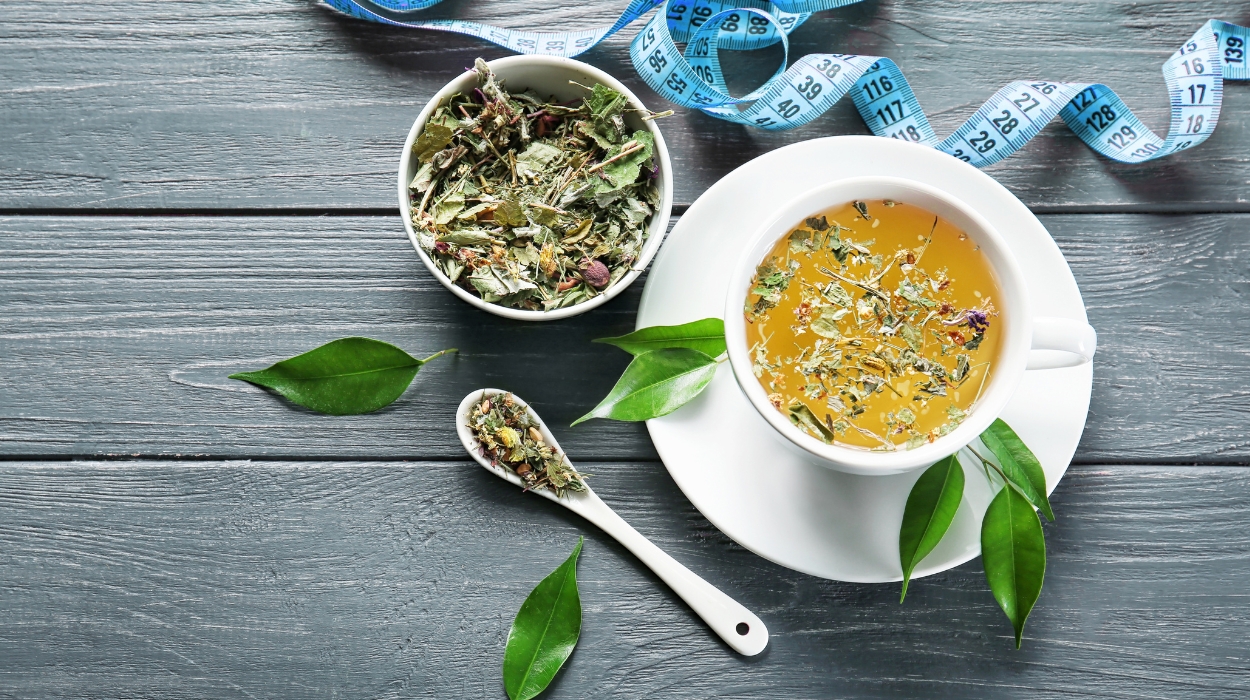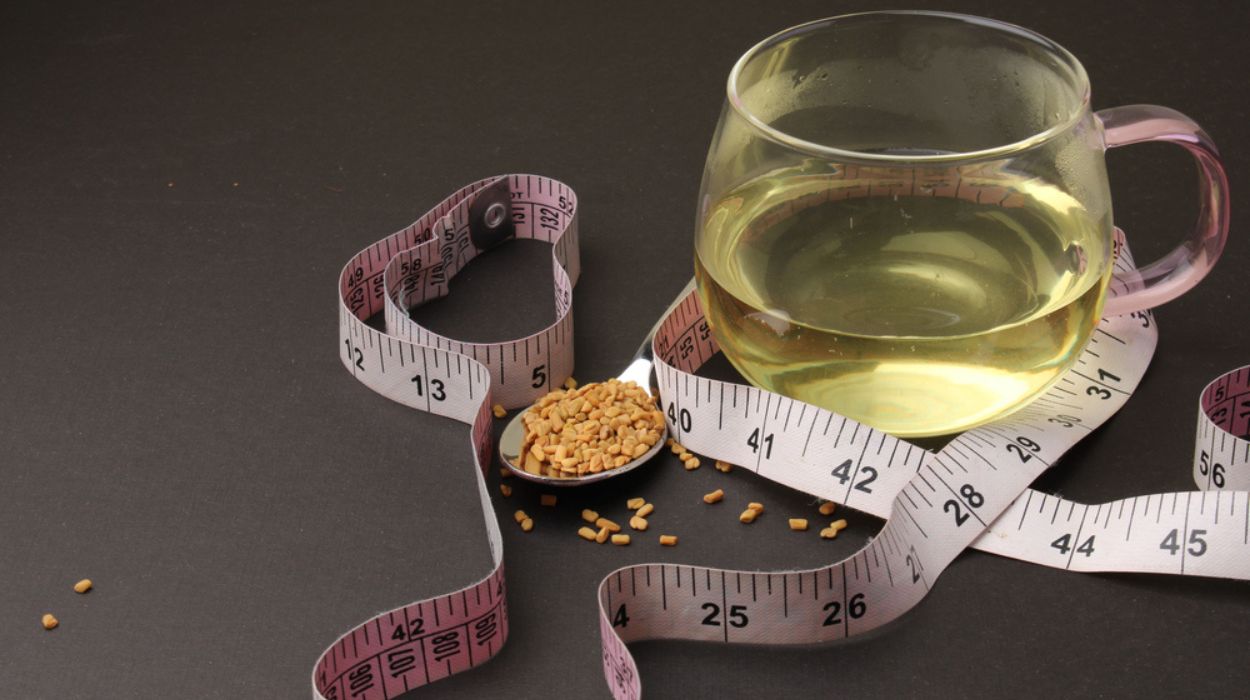When you’re trying to lose weight, you need to be in a calorie deficit. A calorie deficit means you burn more calories than you eat. This means you’ll probably have to eat less than your normal amount.
Even when you have good intentions, it can be hard to stick to a calorie deficit. Cravings and hunger can kick in, leading to overeating. To avoid this, it’s helpful if you can find strategies to keep your appetite at bay.
One such strategy is drinking more tea. Tea adds a burst of flavor, and some teas contain herbs for weight loss.
Below, learn about the appetite suppressant tea. Choose one or two varieties that you like to help you lose weight.
8 Teas That Suppress Appetite
Tea could reduce your appetite and make it easier to diet. Some of the best teas for appetite suppression include:
- Green tea.
- Black tea.
- Fenugreek tea.
- Peppermint tea.
- Hibiscus tea.
- Ginger tea.
- Oolong tea.
- White tea.
Best Tea For Appetite Suppression: 8 Options

You’ve probably heard that you should drink water to lose weight. That’s probably true, but have you ever considered tea?
Different types of tea can be natural appetite suppressants. Some teas include specific ingredients that can decrease appetite. Additionally, tea is composed of water, which helps you feel satiated.
Research[1] has found that drinking water before a meal reduces food intake. Since tea is composed of water, it could have the same effect. Be sure to avoid adding sugar or honey since this will add extra calories.
The tea varieties below may help with appetite control. This will prevent overeating and help you stick to a calorie deficit for weight loss. Some may also have additional benefits, such as increased calorie burn.
Green Tea
Green tea is among the teas that suppress appetite. Research[2] with mice has revealed that green tea consumption reduces food intake. This suggests an appetite-reducing effect. Mice given green tea also significantly reduce weight and body fat.
Clinical trials[3] with humans have also demonstrated that green tea benefits weight loss. While the exact mechanism is unknown, there is evidence that green tea reduces food intake. Again, this suggests it could suppress your appetite.
Green tea comes with other health benefits beyond being an effective appetite suppressant. Some research suggests[3] that it suppresses fat accumulation in the body. This could prevent excess fat gain.
Furthermore, green tea might increase[3] fat and calorie burn, and these effects bring many health benefits. A meta-analysis[4] that reviewed the results of 20 studies found green tea to be significantly beneficial for health. People who consumed green tea experienced decreased blood pressure and cholesterol.
Black Tea
Drinking black tea could also promote weight loss. If you’re looking for the best tea to reduce appetite, black tea might be even better than green tea.
Black tea contains compounds called polyphenols, much like green tea. However, the polyphenols in black tea are more effective[5] for weight loss.
There are several benefits associated with black tea. Black tea polyphenols may boost metabolism[5] in addition to suppressing appetite. They also promote a process called lipolysis (fat breakdown).
As is the case with green tea, black tea has been found[6] to reduce food intake in animal studies. This provides some evidence that black tea could be a natural appetite suppressant. Black tea may be a helpful addition to your weight loss plan.
Fenugreek Tea

Fenugreek[7] is an herbal tea. Native to the Mediterranean region and western Asia, Fenugreek is similar to clover. Its seeds taste like maple syrup, but some fenugreek teas may have a bitter taste.
Fenugreek is among the appetite-suppressant teas, according to research. One study[8] found that drinking fenugreek tea reduced subjective short-term appetite. It also increased feelings of fullness.
Use caution, though. The study noted above did not find that people reduced their food intake after drinking fenugreek tea. You must still count your calories to ensure you don’t overeat.
If you need something to keep your appetite at bay, fenugreek tea might be a good choice. It won’t magically stop you from eating, but you might subjectively feel satisfied after drinking it.
Peppermint Tea
Peppermint tea has a refreshing aroma combined with a sweet flavor. This makes it a good choice for those trying to limit their calorie intake. For no calories, peppermint tea is a flavorful pick-me-up.
Drinking peppermint tea could also reduce cravings for high-calorie foods, helping with appetite control. A study[9] with a peppermint oil capsule found that it reduced appetite. Peppermint tea may have similar effects.
Peppermint tea might suppress your appetite, but it has additional health benefits. Peppermint products could also treat digestive problems. Research[10] has shown that peppermint oil can reduce colon spasms, which could ease digestive discomfort.
Given its benefits for the digestive system, peppermint tea might help you to debloat fast. If you’re worried about belly fat, you might feel better since peppermint tea reduces bloating.
Hibiscus Tea
If you find the pantry calling you to get a snack, try hibiscus tea instead. Research[11] with a hibiscus-containing supplement found that it reduced ghrelin levels, known as the “hunger hormone.” This is important because ghrelin can increase appetite[12] and drive you to eat.
Randomized controlled trials[13] with hibiscus tea have shown that it has benefits beyond appetite suppression. For instance, studies have found that hibiscus can reduce blood pressure and cholesterol levels.
Drinking hibiscus tea won’t just reduce your appetite; it could also lead to a lower risk of heart disease. Add a cup or two daily to your diet to promote overall health.
Ginger Tea
You’ve probably heard of some of the benefits of ginger before. It’s a popular medicinal herb, and it could reduce your appetite in tea. One study[14] found that ginger slightly reduced appetite, but the effects were small.
While ginger tea’s effect on appetite suppression is small, it may still be effective for weight loss. One recent study[15] suggests that ginger tea could help you burn more calories.
In the study, people who consumed ginger tea burned around 100 more calories per day from diet-induced thermogenesis. This term refers to[16] the number of calories burned when consuming food.
Ultimately, these findings suggest that ginger could increase metabolism. This is helpful when you’re trying to burn calories for weight loss.
Oolong Tea
If you’ve ever had a cup of oolong tea, you know how much of a treat this beverage can be. It turns out that it might also help your weight loss efforts.
While it might not directly reduce appetite, oolong tea could have anti-obesity effects. A study[17] with rats fed a high-fat diet found that oolong tea reduced their weight gain. It also lowered their fat mass.
Oolong tea has these benefits because it contains chemical compounds called polyphenols. These compounds have an anti-inflammatory effect, and they could help you lose weight.
If you have trouble controlling your appetite, oolong tea might offset some of the effects of overeating. If you’re experiencing hunger pangs, try a cup of oolong tea before you reach for a snack. The sweet flavor might satisfy your cravings.
White Tea
You’ve probably heard plenty about green tea and even black tea, but there are also white tea varieties. Unfortunately, white tea isn’t as well-researched[18] as other teas. However, it contains chemical compounds that could be helpful for weight management.
White tea contains chemical compounds[18] called catechins, and it’s a natural source of caffeine. These ingredients mean that white tea could boost metabolism and burn fat.
Furthermore, since white tea contains the same chemicals[18] found in green tea, it should have appetite-reducing effects. After all, green tea has been well-studied[19] as an appetite suppressant. It is reasonable to conclude that white tea also has these benefits.
Look for white tea varieties if green or black teas aren’t your first choice. Most boxes will be labeled with the type of tea. There are 100% white tea varieties available, and you are likely to find that they have a pleasant, sweet taste.
Other Things To Keep In Mind
Appetite suppressant teas might help you manage food cravings, which could help you eat less. However, you shouldn’t treat them as a magic weight-loss potion. Even the best tea in the world won’t change the fact that weight loss requires lifestyle changes.
Tea itself isn’t going to burn fat or immediately create weight loss, but it can be a tool that is used alongside a reduced-calorie diet. While tea contains beneficial antioxidants, you may not be able[20] to absorb large amounts when drinking it. In other words, the benefits seen in research do not always translate to real life.
Research on the best tea for weight loss has confirmed that tea should be used with other lifestyle changes. A study[21] with green tea found that it boosts fat burn after exercise. Exercise itself will increase fat burn, with green tea enhancing the effect.
It is also important to consider the potential negative side effects of tea. While most people can drink tea without adverse effects, some people may react badly.
Green tea may cause[22] nausea, vomiting, dizziness, shakiness, sleep problems, and abnormal heart rhythm. Such side effects are usually seen with large quantities of tea. If you think consuming excessive amounts of tea is good for weight loss, think again – you may do more harm than good.
Talk with your doctor or a dietician before trying a new tea if you have concerns about side effects. Ultimately, your best bet is to drink tea in moderation as part of a healthy diet.
Conclusion
Various dietary supplements are available to help you lose weight. However, something as simple as tea might do the trick. Several randomized controlled trials have found that tea has benefits for weight loss and appetite regulation.
Heat up one of the teas discussed here if you are experiencing cravings while trying to lose weight. Tea provides a burst of flavor, filling your stomach to ward off hunger. Just avoid adding sugar or other sweeteners, as this will increase your calorie intake.
There are countless flavors of tea available at the grocery store, so there really is something for everyone. Even if you don’t choose one of the teas that suppress appetite, tea is a zero-calorie beverage. Add it to your diet to fill you up, which could help you lose weight.
Remember that tea won’t magically burn significant amounts of fat on its own. It’s important to exercise and follow a reduced-calorie diet for best results.
Frequently Asked Questions
Water has been shown to reduce appetite by increasing feelings of fullness. Some teas, such as green tea, can also suppress appetite.
Several herbal teas have been proposed to reduce appetite and food intake. Consider varieties like ginger tea, fenugreek tea, and hibiscus tea, among others.
Teas like green tea, white tea, and black tea are high in compounds like catechins and caffeine, which can stimulate fat burn.
Some research suggests that peppermint can reduce appetite. Peppermint tea may have similar effects, but individual results may vary.
 Evidence Based
Evidence Based
